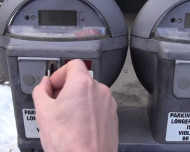7/30/2013
New Hampshire Town Sues Over Meter FeedingKeene, New Hampshire alleges conspiracy on the part of meter feeders.

A group of residents in Keene, New Hampshire thought the city was gaining a bad reputation for its predatory parking meter enforcement and decided to do something about it. The organized an effort to regularly feed coins into the meters so that other residents and visitors could avoid having an expensive ticket slapped on their windshield. Instead, they receive a card telling them that Robin Hood and the Merry Men have "saved you from the king's tariff." As a reward for their generosity, the city is suing the Robin Hooders for civil conspiracy to interfere with a contract. A hearing on the case is scheduled for August 12.
"Because they often try to beat me to an expired meter, they will run up behind me very quickly, which is startling and makes me nervous," meter maid Linda A. Desruisseaux said. "In particular, Graham Colson likes to taunt me by saying, 'Linda, guess what you're not going to do today -- write tickets.'"
Keene employs three meter maids, and the Robin Hood activists are organized enough to ensure meters are fed before any ticket can be issued. To protect themselves against false accusations, they document the meter feeding effort and upload the video to YouTube. The city insists that the Robin Hooders' conduct is not protected by the Constitution.
"The content of defendants' speech is not relevant to a First Amendment analysis," Erik G. Moskowitz, an attorney retained by the city, wrote. "Through its injunction request, the city seeks a content-neutral, easily measured 50-foot safety zone. The city does not seek to limit defendants' ability to videotape city employees from a 'comfortable remove.' Nor, to the extent that defendants' activity of feeding meters can be considered a First Amendment activity, does the city seek to prevent defendants from engaging in that activity."
Though it asks for a fifty-foot buffer, the city cited a First Circuit case, Glik v. Cunniffe, which concluded a ten-foot buffer was sufficient. The primary purpose of the extra-large buffer zone is to keep the Robin Hooders from feeding meters.
"The city also has a protected property interest in the employment relationship between it and the PEOs [parking enforcement officers] based on the PEOs's performance of parking enforcement activities for the city in exchange for consideration and benefits," Moskowitz argued. "Defendants' continued interference with this contractual relationship will impact the city's property interest."
In response, the Robin Hooders argued the city has no right to protect its public employees from the speech of residents on sidewalks and other public areas. The group cited the official job description of a meter maid requiring that individuals be able to "endure verbal and mental abuse when confronted with the hostile views and opinions of the public." The Constitution guarantees the right to petition the government, even if the message from the public is unwelcome.
"There is no principled distinction between protecting a listener from an unwelcome message versus suppressing the speech of the speaker," Robin Hood lawyer Jon Meyer wrote in his brief to the court.


